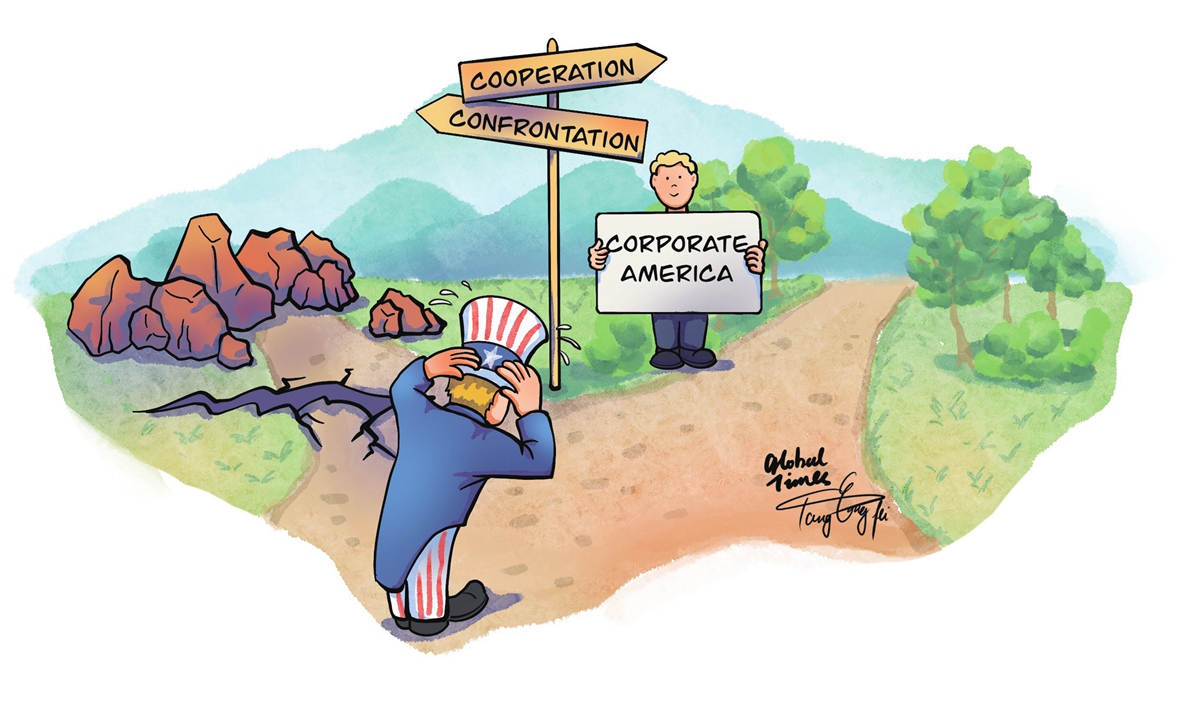Opinion: US wants to shift trade policy toward China, but is still headed for a dead end

Illustration: Tang Tengfei/GT
In a testimony before the US House's Ways and Means Committee, US Trade Representative Katherine Tai on Wednesday said that the US needs to "turn the page on the old playbook" when it comes to trade policy toward China, while suggesting moving further on a wrong approach of pressuring and decoupling.Washington's top trade official said the US needs to find new "tools" besides the phase one trade deal to more directly confront China's "unfair economic policies and practices," and to bolster trade ties with more economies and work out domestic tools to get rid of dependence on the Chinese economy, according to media reports.
Some US media reports said that Tai's remarks reflect a noticeable shift in tone in the US' handling of its trade relationship with China, suggesting from the "good-faith effort" to engage China. To say the least, that's extremely confusing, because the US government's ever-intensifying crackdown on Chinese products and companies do not seem to be "good-faith," far from it.
It's true that the Biden administration needs a shift in trade approach toward China, but instead of moving further in the wrong direction of pressuring and decoupling, it needs to take steps to de-escalate tensions, or it will hit a dead end.
Certainly, it's not US' "good-faith effort" that is hitting limits, as suggested; it's the US' malicious hostile approach that is hitting limits. Despite Washington's rising hostility toward China, many in the country, including hawkish US politicians, appear to be concerned about the rising costs of the US' trade war on US businesses and consumers.
At Wednesday's hearing, some US lawmakers pressed Tai about how tough she would get on "Chinese barriers to market access," while others urged Tai to set up an easier process for US companies to get exemptions from hefty tariffs the US imposed on Chinese goods.
Speaking about the US government's earlier decision to reinstate 352 expired product exclusions from US "Section 301" tariffs on Chinese imports, US Congressmen Adrian Smith said "all Americans affected by the tariffs should have an opportunity to apply for exclusions."
The US' struggling economic situation and rising complaints from the US business community about the trade war demand the Biden administration to ease trade tensions with China. There are countless evidences showing that the US' trade war has caused severe losses on the US economy. The US' $300 billion to $400 billion tariffs in Chinese imports have cost the US more than 245,000 jobs at peak and it would cost more than 732,000 US jobs as tensions escalated, research from Oxford Economics in last year showed.
It's obvious that US companies will suffer further losses, if the US government imposes more trade penalties on China, including punitive tariffs on Chinese products and crackdowns on Chinese firms.
A recent survey by the American Chamber of Commerce in China showed that as the Biden administration keeps in place tariffs and sanctions against Chinese products and companies and even further escalated crackdowns on Chinese firms, US businesses, which are seeing profit growth and improving business environment in China, are increasingly worried about "rising tensions."
When asked to expand tariff exemption, Tai said such a move should serve the US' "strategic interests." It's clear that the voice of the US business community is more representative of US strategic interests than US anti-China politicians. When the Biden administration formulates a new trade policy toward China, it should listen more to the growing calls of the US business community to restore trade ties with China.
The author is a reporter with the Global Times. bizopinion@globaltimes.com.cn
